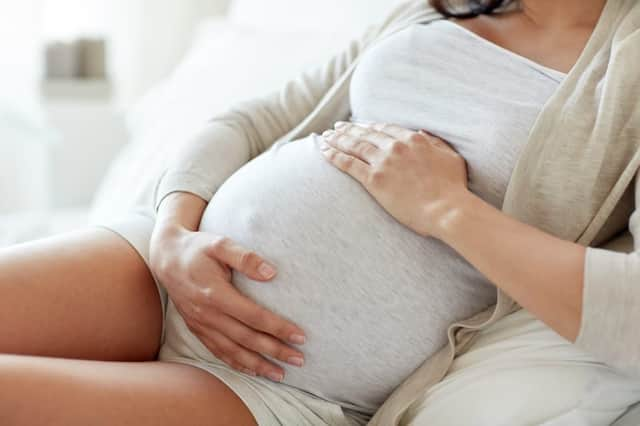This is the advice for pregnant women amid the coronavirus outbreak


As coronavirus diagnoses continue to climb in the UK, with more than 1,500 cases now confirmed, fears are growing over who is most vulnerable to contracting the virus.
Public Health England (PHE) announced a list of the most ‘at risk’ groups of people, citing those with weaker immune systems and long-term respiratory illnesses as the most under threat.
Advertisement
Hide AdAdvertisement
Hide AdHowever, the outbreak is also a cause for concern for pregnant women.
What is the advice for pregnant women?
Pregnant women have been “strongly advised” to follow the proposed social distancing measures set out in government guidance.
The government’s chief medical officer said that women who are pregnant are now being included in the list of vulnerable, or ‘at risk’, groups of people as a “precautionary measure”.
The advice suggests that pregnant women should use telephone or online services to contact their GP, or other essential services, and avoid face-to-face contact where possible.
Advertisement
Hide AdAdvertisement
Hide AdThe Department of Health and Social Care (DHSC) issued clarification on the difference between who should be in household isolation and who should take social distancing measures on Tuesday (17 Mar), including advice for pregnant women.
The DHSC said: “From today we are asking all individuals to follow social distancing measures to delay the spread of the virus.
"If you are 70 or over, under 70 but have an underlying health condition (you are eligible for an adult flu vaccine), or a pregnant woman you are strongly advised to follow the below guidance:
Avoid contact with someone who is unwell;
Avoid public transport;
Work from home;
Avoid large gatherings, religious congregations, and gatherings in smaller public spaces such as pubs, cinemas, restaurants, theatres, bars, clubs;
Advertisement
Hide AdAdvertisement
Hide AdAvoid gatherings with friends and family particularly if someone has symptoms of Covid-19 or has recently been unwell;
Anyone who has symptoms or anyone who has been in contact with someone symptomatic should not be in contact with a vulnerable person for at least seven days;
Use telephone or online services to contact your GP or other essential services."
What is ‘social distancing’?
Social distancing simply means reducing the amount of social interaction with other people, in an effort to reduce the transmission of coronavirus.
Advertisement
Hide AdAdvertisement
Hide AdThe government has urged people to avoid all contact with anyone who is displaying symptoms of coronavirus, including a high temperature and a new continuous cough.
If anyone in your home is symptomatic, the whole household should stay at home for 14 days to avoid the spread of infection. Those who live alone should isolate themselves for seven days.
Everyone has been asked to undertake social distancing measures to help delay the spread of coronavirus, with avoidance of non-essential use of public transport, working from home, and avoidance of large gatherings being among the key efforts.
Coronavirus: the facts
What is coronavirus?
COVID-19 is a respiratory illness that can affect lungs and airways. It is caused by a virus called coronavirus.
Advertisement
Hide AdAdvertisement
Hide AdWhat caused coronavirus?
The outbreak started in Wuhan in China in December 2019 and it is thought that the virus, like others of its kind, has come from animals.
How is it spread?
As this is such a new illness, experts still aren’t sure how it is spread. But similar viruses are spread in cough droplets. Therefore covering your nose and mouth when sneezing and coughing, and disposing of used tissues straight away is advised. Viruses like coronavirus cannot live outside the body for very long.
What are the symptoms?
The NHS states that the symptoms are: a dry cough, high temperature and shortness of breath - but these symptoms do not necessarily mean you have the illness. Look out for flu-like symptoms, such as aches and pains, nasal congestion, runny nose and a sore throat. It’s important to remember that some people may become infected but won’t develop any symptoms or feel unwell.
What precautions can be taken?
Washing your hands with soap and water thoroughly. The NHS also advises to cover your mouth and nose with a tissue or your sleeve (not your hands) when you cough or sneeze; put used tissues in the bin immediately and try to avoid close contact with people who are unwell. Also avoiding touching eyes, nose and mouth unless your hands are clean.
Advertisement
Hide AdAdvertisement
Hide AdShould I avoid public places?
Most people who feel well can continue to go to work, school and public places and should only stay at home and self isolate if advised by a medical professional or the coronavirus service.
What should I do if I feel unwell?
Don’t go to your GP but instead call NHS 111 or look online at the coronavirus service that can tell you if you need medical help and what to do next.
When to call NHS 111
NHS 111 should be used if you feel unwell with coronavirus symptoms, have been in a country with a high risk of coronavirus in the last 14 days or if you have been in close contact with someone with the virus.
Sources: World Health Organisation and NHS